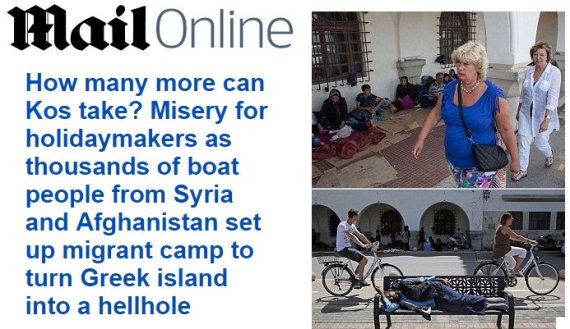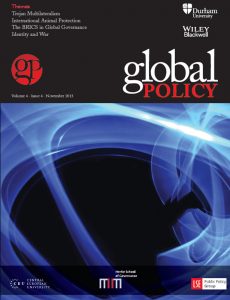Tourists and refugees: two worlds that aren’t supposed to collide.

Picture used courtesy of: http://www.dailymail.co.uk/news/article-3099736/Holidaymakers-misery-boat-people-Syria-Afghanistan-seeking-asylum-set-migrant-camp-turn-popular-Greek-island-Kos-disgusting-hellhole.html
You have to hand it to the Daily Mail. Their writers have perfected the art of pressing people’s buttons; of making highly divisive clickbait, or, as my dad might’ve said, of stirring up sh*t. Last week’s article about British tourists in Greece being outraged by the influx of refugees coming from Turkey caused plenty of outrage and counter-outrage both online and in other parts of the British press. Even by its own standards of outrage, this was outrageously outrageous. Job well done Daily Mail.
The Mail highlighted the incongruous mix of outsiders that have been arriving on the island of Kos in recent weeks. One group are refugees from Syria and Afghanistan, who are seeking refuge in Europe from war, homelessness, and complete desperation back home. The other group are middle- or working-class white holiday-makers from the UK who go to Kos for sun, sea, booze and food. These two groups are not supposed to meet. This isn’t in the script. They might gaze upon at each other’s worlds briefly on TV or computer screens, but physical co-presence between these two worlds is not supposed to happen.
The Daily Mail’s story was based on the perspective of the tourists who were dismayed that they should have to share the island with untidy-looking refugees:
Calling it ‘disgusting’, Anne Servante (a nurse from Manchester) fumed: ‘We have been coming here for almost ten years. We like to eat, drink and relax. But this time the atmosphere has changed. It’s really dirty and messy here now. And it’s awkward. I’m not going to sit in a restaurant with people watching you.’
Another British couple on holiday with their grandchildren from Birmingham said: ‘We have never been before but we don’t like it. We won’t be coming back if it’s like a refugee camp again next year.’
The Mail article has caused plenty of reaction by people rightfully disgusted by the lack of compassion and sense of privilege which the newspaper is encouraging. Yet depressingly, far-right groups such as Britain First have also jumped on the article as evidence of the threat to the western way of life posed by (muslim) migrants.
The story is only one example of broader trends. The rich and poor worlds have been able to distance themselves from one another for a long time, but globalisation is meaning that the two are coming into spitting-distance of one another more and more often. We can see migrants trying to enter the UK camped out in the so-called ‘Jungle’ camp in Calais; or the Mediterranean ‘boat people’ drowning as they try to get to Italy from war-torn North Africa. Or on the other side of the world, we can see refugees and migrants from central Asia trying to get to Australia, only to be detained in ‘beautiful prison camps’ in tropical Papua New Guinea.
In a previous post I wrote about John Urry’s concept of ‘Offshoring’ – how rich countries displace ‘bad things’ onto poor countries, as a function of free trade and globalisation. These bad things include dangerous and dirty jobs, hazardous waste, prostitution, gambling, torture and pollution. It is completely unsurprising that poor people try to escape from this to the rich world, especially when we add in poverty, and even more so in times of war. However, the process of off-shoring, as with migration, is mostly one-way. Rich countries can off-shore bad things, and rich (white) people can wander around the world as tourists or ‘expats’ (not ‘immigrants’ – that’s a word for other people), but for all but the luckiest, the door slams shut to poor migrants wanting to come here.
There are two main kinds of migration: economic migrants and refugees/asylum seekers. The first are a serious danger to the levels of affluence that rich countries enjoy – our rich way of life is in danger of being undermined by the poor, and it is immigration controls, perhaps more than any other factor, which keep things as they are. These arrangements are political, not economic, and even the most ethically minded, internationalist, left-leaning politicians in the West would never meddle with them, however inherently unfair they are. It is an uncomfortable truth that Ha Chung Jang writes about in his seminal book ‘23 Things They Don’t Tell You About Capitalism’. He writes:
“If there were free migration, most workers in rich countries could be, and would be, replaced by workers from poor countries. In other words, wages are largely politically determined. The other side of the coin is that poor countries are poor not because of their poor people, many of whom can out-compete their counterparts in rich countries, but because of their rich people, most of whom cannot do the same.”
It is therefore unsurprising that rich countries maintain immigration controls. The British lifestyle I enjoy has been constructed over hundreds of years of wealth accumulation, colonialism, exploitation, and luck. I stand on the shoulders of giants. Remove immigration controls, let in the eager, clever, entrepreneurial ‘poor’ and my privileged lifestyle would disappear quicker than you can say “competitive labour market”. This is one of the great unspoken ‘rules’ of global capitalism, and you can forget about any politician in the West doing anything about it.
The second kind of immigration concerns people escaping war and repression. Politicians in rich countries are more vocal and active about our responsibilities to this set of people, or at least, historically they have been. The UK has a fairly good track record of taking in refugees from say, Nazi Germany in the 1930s, or the Ugandan Asians fleeing Idi Amin in the 70s, or Vietnamese boat people in the 80s. Recently though, we seem increasingly reluctant. After more than 1,750 Mediterranean migrants have died or gone missing trying to get to Italy, one of Cameron’s first acts since his recent re-election was to opt out of an EU proposal to allocate these refugees evenly among member states. As for Syria, the UK has taken only 187 refugees from the 20,000 who have applied for asylum in the EU.

Vietnamese boat people in the 1970s. The term ‘boat people’ used to sound historical, but it’s coming back. By Lt. Carl R. Begy [Public domain], via Wikimedia Commons
The Australian government has also signed a similar deal with Cambodia to take refugees off its hands. Offshoring poor people back to poor countries by bribing cash-strapped governments is an innovative, if highly morally-dubious strategy to keep the two worlds apart. But as we see with increased regularity, the global poor keep coming, driven by poverty and war. We don’t want to see them, we don’t want them to ruin our holidays, and we don’t want to be reminded of the underlying threat they pose to our privileged way of life. But can we stop them forever? Should we?





1754-9469/asset/society_affiliation_image.gif?v=1&s=9197a1a6ba8c381665ecbf311eae8aca348fe8aa)
